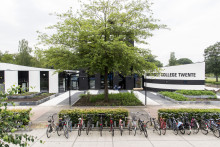As Sivakumar talks about and reflects upon his classroom performance, Milan Gomes nods along during moments of recognition. The 21-year-old ATLAS student has attended numerous of Sivakumar’s classes and shares the outlines of his vision on education. He recalls a particular lecture by Sivakumar on brainwaves. Complicated subject matter that he could not really relate to. ‘But as a teacher, Kishore is very good at taking difficult subject matter back to basics, so that everyone has a proper understanding of the content, and then delving deeper into the topic with the students. If you have that skill as a teacher, you really make a difference.’ This puts a contented smile on his teacher’s face. ‘Thanks, Milan.’
Learning coach
Both share the view that the role of teachers – especially those at university institutions – is changing, although they both have finer points to add. According to Sivakumar, it is not so much that the role is changing, but that today’s teacher has to be more versatile than ever before. He believes that just imparting knowledge is not enough. They must also assume a leading role and provide more depth. According to Gomes, it’s not just about being more versatile; above all, the teacher’s role has become more complex. This is something he has also noticed with his mother, who is a teacher at an educational institution. The teacher’s primary task – imparting knowledge – is also her main concern, he says, but he believes that qualities such as responsibility and coaching competences are increasingly important. ‘And think of all the systems teachers have to manage and keep updated. They practically have to be IT experts.’
Sivakumar has been employed at the UT for over two years and has been buzzing around campus like a busy bee since his very first day at work. The diligent researcher – born and raised in India – is not just an avid teacher – both at ATLAS and the BMS faculty – he is also almost halfway through his PhD studies. His research focuses on the development of new pedagogical designs and tools at the intersection of educational sciences, engineering education and philosophy of science.
Inspiration
Sivakumar has put a lot of thought into the question of what makes a good teacher. According to him, it is very important for a teacher to know when they are making a difference. Inspiration plays a central role in this regard. Not just in traditional teaching, but especially in contact with students. He draws this conclusion based on his own experiences as a student. When he was a young student, he had many teachers who were able to explain things in a clear way, but did not connect with him the way other teachers could. So where lies the difference? In their inspiration. According to Sivakumar, you can only inspire others as a teacher if the subject matter you are explaining also greatly interests you personally. Only then can you be deeply passionate.
He believes that inspiration and passion are also the core values that make the difference between a good and an even better teacher. Being transparent. What do I stand for as a teacher? Which direction do I want to take? According to Sivakumar – who previously studied in Madras and Paris – every teacher makes a difference in their own way. But in terms of his own measure of success, he only feels useful when he can ‘make a little impact’ on society through a student.
Expression
Leading, inspiring, engaging. Sivakumar feels that the qualities by which he tries to stand out are best conveyed through non-verbal communication. As a result, online teaching was extremely difficult for him – especially during the lockdowns. And it still is. He considers himself a teacher of interaction and expression. Suddenly, all that was no longer possible. He recalls one final class of a semester when he finally got to teach his class face-to-face again. Gomes – who nods affirmatively and smiles – was also part of this class. It was only then that he realised the importance of expression. Because that particular class was unlike any previous one, he says, even though the subject matter hardly differed.
Striving towards innovation, enthusing students with new concepts and information, or even experimenting with emerging forms of instruction, such as blended learning. These are things that make Gomes happy as a student. And what Sivakumar enjoys most – even though he knows it is a huge cliché – is when a student has a Eureka moment. When someone gets a twinkle in their eye, or starts smiling when the penny finally drops. Playing a small role in students’ acquisition of knowledge, that’s what I do it for.’






